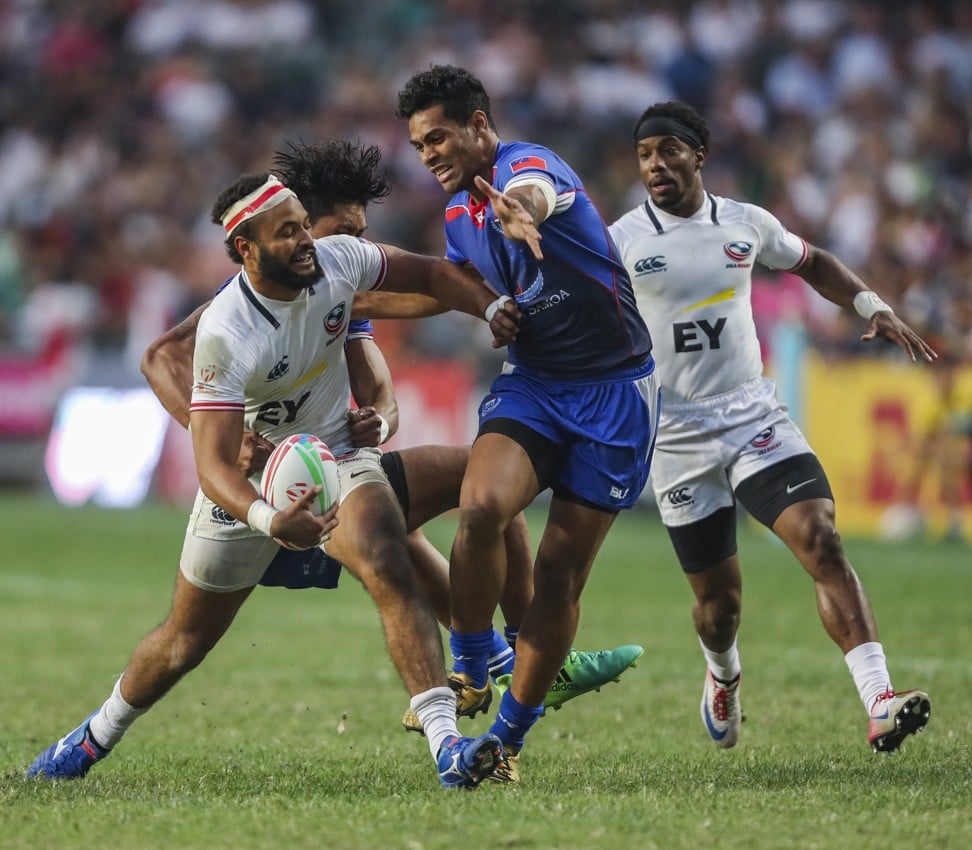
2020 Hong Kong Sevens: Golden Eagles booster club is money in the bank for developing rugby in US
- A group of rugby-loving businessmen has helped a start-up sevens programme grow into perennial contenders in a matter of years
- The Golden Eagles now have close to 50 members and donate more than US$1.5 million to the teams every season
“I would go to the Sevens and listen to all the people with funny English accents talk about how much we sucked,” he said with a laugh. Bobbett, who moved to the city in his early 20s, found success starting his own manufacturing and supply product company, and decided it was time to put his money where his mouth was.
When the IOC announced in 2011 that sevens was going to be in the 2016 Rio Olympics, Bobbett had had enough playful ribbing from his friends, given the US men’s side were in danger of not even qualifying for the illustrious event.
“We had another typical American outing at the Hong Kong Sevens that year so I picked up the phone and called the coach.”

That man was Alexander Magleby and neither minced words after meeting up for dinner in the US. Magleby had just taken over from Al Caravelli and the US men’s rugby team officially became a professional programme in January of 2012. Eleven players signed contracts, but it was nowhere near the level needed to either retain or attract top talent.
“I got together with him, and I said, ‘Why are we so bad?’ And he said, ‘We don’t have funding’.”
A lot of the players were still working full-time jobs, which was an obvious logistical problem for a programme trying to get off the ground. So Bobbett got together with a few of his like-minded business friends who were also rugby lovers and former players, and a few other key figures who were also keen to find a way to support the Eagles’ team. They met in Las Vegas for the 2012 sevens tournament and the Golden Eagles were born.
The entrance fee was, and still is, high (US$10,000 minimum), and what was initially a handful of members quickly turned into dozens and is now about to break 50. The rise of the US sevens rugby programme had also reached a new phase after the formation of the Golden Eagles. Caravelli left and Mike Friday came in during the summer of 2014.
During the 2014-15 series the team finished sixth overall, their best ever result, and soon what were journeymen and cast-off athletes pulling together side gigs and part-time jobs to make ends meet quickly became household names around the world.

Bobbett said he’s been lucky enough, along with the other Golden Eagles, to have a front-row seat for the progression of the programme, which welcomed the women’s side during its inaugural season in 2012-13 and now regularly contributes more than US$1.5 million to the programme annually.
“There’s a lot of closeness between the players and the Golden Eagles,” said Bobbett. “The character of our players is amazing, they’re doing it for the love of the sport, not the notoriety. They’re more recognised in Hong Kong and London than they ever are back home.”

The Golden Eagles regularly travel to other sevens events including Los Angeles and Cape Town, also have chapters in the US, London and Singapore and will head to Vancouver (March 7-8) for the first time. At each stop there are events to help raise funds and also give back to local rugby communities.
Bobbett, who said he expects 25 Golden Eagles to attend the 2020 Cathay Pacific/HSBC Hong Kong Sevens (April 3-5), hopes his squad, who sit in ninth place in the World Rugby HSBC Sevens Series after three legs, can this year dethrone the Fijians, the five-time defending champions. Last year the Americans lost 28-19 to Fiji in the semi-finals and finished third after beating Samoa.
Bobbett admits upsetting the world’s most successful team is a common conundrum among the sevens world right now. Fiji are sixth in World Series standings.
“I think that’s a question every team in the sevens are asking themselves right now. How to do that here in Hong Kong.”

